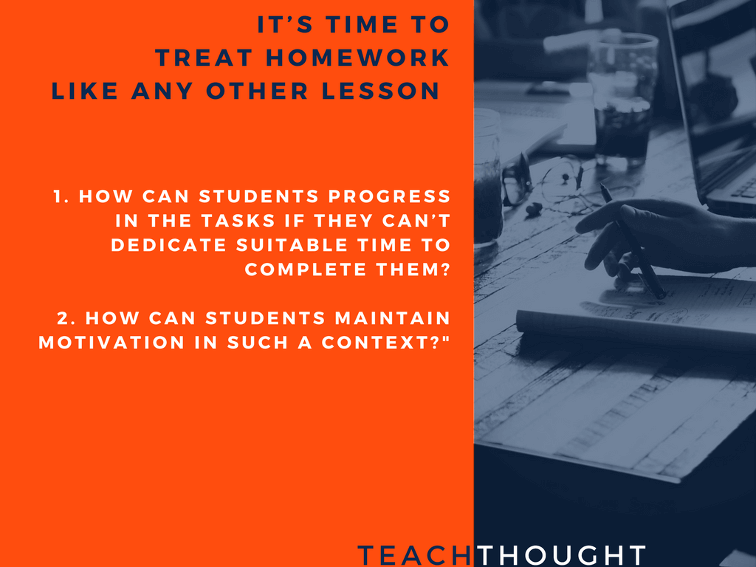
Let’s Treat Homework Like Any Other Lesson
by TeachThought Staff
Imagine observing a lesson in which you see a teacher give the students two or three or four times more work than they can handle. Or more critically, that much more than actually will help them learn.
You’d be scratching your head.
You would walk out of the lesson disappointed, perplexed at the lack of quality teaching happening. But worse, as you wander the school you observe the same thing happening in every classroom you enter, even in the rooms of your best and most experienced teachers. Alarm bells would hardly be the appropriate metaphor.
A grand inquiry would follow, and understandably so. The number of areas for concern would be many, but needn’t move past these two:
How can students progress in the tasks if they can’t dedicate suitable time to complete them?
How can students maintain motivation in such a context?
This is what potentially happens every time teachers set homework for their students. Whether homework should or shouldn’t be given is up to individual schools, but most secondary schools very much do. The amount of time a student can dedicate to homework is not infinite. It is limited. So assigning too much on a night is like giving too much work in a lesson. It’s unproductive, and just flat out poor teaching.
So why does it happen? There are so many alternatives to homework. No teacher in his/her right mind would allow such a scenario to exist surely? Of course not, but it does because teachers don’t have the information to prevent it from happening. They don’t know how much work their students have already been given as they enter the classroom.
For example, a Math teacher thinking of setting a homework task has no idea what homework students were assigned in other classes. She may turn to the centralized calendar for hope, but alas, it becomes a pointless exercise, as she realizes the fact that many of her students have come from different English and Science classes, as well as various electives.
Her only options are to poll the students live (how reliable is that?) or to set the task blindly–randomly, if you will. She won’t be able to take the grumbling from the students that they have too much work on already as evidence, as she may not believe their motivations for their protests.
See also Using Homework As Formative Assessment
The very same situation occurs when the students leave the Maths class, separate, and venture to their next subject. The inefficiency of the situation is startling, and it’s incredible that it has persisted for so long in schools all over the world.
Of course, it has all the notification qualities you’d expect to keep parents and students always in the loop, but because it forced teachers to consider the number of time students has spare to complete tasks, it reimagined the whole notion of homework, and how teachers should begin to see it in a similar fashion as to any normal lesson, a lesson in which overloading has no pedagogical place.
